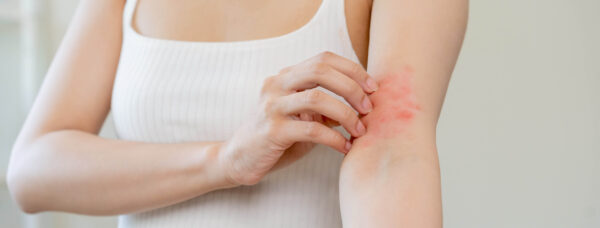Eczema Explained: Managing Flare-Ups and Soothing Your Skin
Published on April 1, 2024 by Westchester Center For Dermatology
Eczema is a common skin condition that affects millions of people worldwide, causing red, itchy, and inflamed patches of skin. Understanding eczema, its triggers, and effective management strategies can improve the quality of life for those affected. In this blog post, we’ll be talking about what eczema is, explore if it can be cured, and offer skin-soothing practices for eczema management.
What Is Eczema?
Eczema, also known as atopic dermatitis, is a chronic skin condition characterized by dry, itchy, and inflamed skin. The severity and symptoms can vary from person to person. It commonly includes redness, swelling, and sometimes oozing or crusting. While eczema can occur at any age, it typically starts in childhood and may improve or resolve by adulthood. The exact cause of eczema is not fully understood but is believed to involve a combination of genetic and environmental factors.
Can Eczema Be Cured?
Currently, there is no cure for eczema, but there are many treatments and lifestyle changes that can manage symptoms and reduce flare-ups. The goal of treatment is to heal the affected skin and prevent further irritation or infection. A personalized approach, often involving a combination of remedies and strategies, is usually the most effective.
Skin Soothing Practices For Eczema Management:
Hydrocortisone Cream
Hydrocortisone cream is a topical steroid that reduces inflammation and is effective in treating eczema flare-ups. It works by suppressing the immune response that causes inflammation, thereby relieving itching and redness. However, it should be used with caution and under the guidance of a healthcare professional, as overuse can lead to skin thinning and other side effects.
Moisturizers
Moisturizing is crucial for managing eczema. It helps to maintain the skin’s barrier, preventing dryness and irritation. Look for moisturizers labeled for sensitive skin or specifically formulated for eczema. These products are usually free from fragrances and irritants that can exacerbate symptoms.
Emollients
Emollients are a type of moisturizer that softens and smooths the skin. It provides relief from itchiness and dryness. They fill in the gaps between skin flakes, creating a protective layer that retains moisture. Regular application of emollients, especially after bathing, is recommended for optimal skin health.
Colloidal Oatmeal Baths
Colloidal oatmeal baths can soothe eczema-affected skin by providing moisture and reducing inflammation. The fine powder forms a protective barrier on the skin, which helps to retain moisture and ease itching. These baths can be particularly beneficial during flare-ups.
Topical Calcineurin Inhibitors
These non-steroidal medications reduce inflammation and symptoms by inhibiting the immune system’s activity on the skin. They are an alternative to steroid creams and are used for treating moderate-to-severe eczema, particularly in sensitive areas like the face and neck.
Eczema Triggers
Identifying and avoiding eczema triggers is key to managing the condition. Common triggers include certain foods, fabrics (such as wool and synthetic materials), environmental factors (like pollen and pet dander), and stress. Keeping a symptom diary can help identify personal triggers.
Wet Wrap Therapy
This involves wrapping the affected skin with wet bandages over moisturizers or medications to enhance the skin’s absorption of hydration. Wet wrap therapy can significantly reduce symptoms and is often used for severe eczema cases.
Phototherapy
Phototherapy uses controlled exposure to ultraviolet (UV) light to reduce inflammation and itching. This treatment is usually recommended for severe eczema that hasn’t responded to other treatments.
Antihistamines
Antihistamines can relieve itching, especially when eczema flare-ups interfere with sleep. They work by blocking the action of histamine, a substance in the body that causes allergy symptoms.
Skin Barrier Creams
These creams are designed to repair the skin’s natural barrier, which can be weakened by eczema. They typically contain ingredients like ceramides and fatty acids, which help to prevent moisture loss and protect against irritants.
Ceramides
Ceramides are lipid molecules found in the skin’s barrier. They play a crucial role in maintaining skin hydration and integrity. Using products containing ceramides can help restore the skin’s natural barrier and retain moisture.
Allergen Testing
For some, eczema flare-ups are linked to specific allergies. Undergoing allergen testing can identify these triggers, allowing individuals to avoid them and potentially reduce the frequency of flare-ups.
Elimination Diet
An elimination diet involves removing certain foods from your diet that are suspected of causing allergies or sensitivities, which can exacerbate eczema symptoms. This should be done under the guidance of a healthcare professional to ensure nutritional needs are met.
Biologics
Biologics are advanced medications that target specific parts of the immune system involved in the inflammatory process of eczema. They are used for severe cases and can offer relief when other treatments have failed.
Stress Management Techniques
Stress is a known trigger for eczema flare-ups. Practices such as meditation, yoga, and deep breathing exercises can help manage stress levels and may reduce the frequency and severity of flare-ups.
Cotton Clothing
Wearing clothing made from natural, breathable fabrics like cotton can prevent irritation and discomfort, making it a suitable choice for those with eczema.
Humidifier
Using a humidifier to add moisture to the air can prevent dryness, which can aggravate eczema symptoms. This is especially helpful in dry climates or during the winter months.
Eczema Support Groups
Eczema support groups can provide valuable emotional support and practical advice from others who understand what it’s like to live with eczema. These communities offer a space to share experiences, tips for managing symptoms, and information about the latest treatments. They can be found in various formats, including online forums, social media groups, and in-person meetings, making it easier to connect with others regardless of your location.
Concerned About Eczema? We Can Help.
Eczema can be a frustrating and uncomfortable condition. At Westchester Cosmetic Dermatology, our experienced team is dedicated to helping you manage your eczema effectively. We offer comprehensive consultations to diagnose your eczema and develop a personalized treatment plan tailored to your unique needs.
Our eczema management services include:
- Accurate diagnosis: We utilize the latest diagnostic tools to determine the specific type of eczema you’re experiencing.
- Personalized treatment plans: We develop a treatment plan that considers your individual symptoms, triggers, and preferences. This may include medication, lifestyle modifications, and other therapies.
- Ongoing support: We are here to support you throughout your eczema journey. We provide ongoing monitoring, adjust treatments as needed, and answer any questions you may have.
Don’t let eczema control your life. Contact Westchester Cosmetic Dermatology today to schedule a consultation and explore effective management options.



